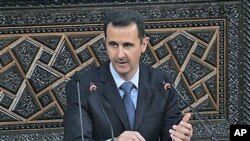President Bashar al-Assad told parliament that Syria will defeat those behind a "plot" against his country. Assad said he would continue on the path of reform for Syria - but did not announce the lifting of a state of emergency, as protesters have desired.
Members of the Syrian parliament gave an effusive show of support for Assad as he entered parliament to discuss the recent wave of unrest shaking his country. Assad had remained silent throughout the crisis, and his first address was eagerly awaited.
His hand appeared to have been strengthened by a series of pro-government rallies across the country on Tuesday. Tens of thousands of Syrians took to the streets of more than half a dozen cities to cheer on the president, eclipsing recent violence in the towns of Daraa and Latakia.
However, news reports say hundreds of chanting protesters took to the streets in Syria's coastal city of Latakia, just hours after Assad delivered his speech.
Assad expressed regret for the violence and bloodshed that has killed and wounded dozens, but stopped short of apologizing. He noted that regional upheaval was in part responsible for developments in Syria, and denounced what he called foreign and domestic plots.
He said that Syria is facing a major conspiracy today, and that some of its threads stretch far, some near, and others are inside the country. He stressed that the conspiracy has been shaped both in its form and its timing by what is taking place in other Arab countries. He argued that plotters are mixing three elements: sectarian strife, reform and material needs, but that sectarian strife has taken the forefront.
Assad had been expected to announce a lifting of the state of emergency in place for the past 50 years. He did not do so, but said a draft bill on that - along with one on a multi-party system - was taking too long. Under the current emergency law, security forces have sweeping powers of arrest and detention.
He said that reforms announced Thursday did not begin from scratch, and have been under discussion for a while, especially formation of political parties. He added that other reforms will be announced when they have been discussed and ratified. He pointed out that the reforms deal with media laws, corruption, and unemployment.
Jihad Makdissi, spokesman for the Syrian Embassy in London, called Assad a “reformer” and insisted that he would live up to that expectation.
"I have enormous confidence that President Assad is a reformer and he believes in reform and he will deliver. He will be ending - he already announced this - the martial law that will allow Syrians to live under normal rule of law and at the same time it will allow us to avoid any abuse of power by anyone," said Makdissi.
Joshua Landis, who is director of the Center for Middle East Studies at Oklahoma University, called President Assad’s address Wednesday an “old-line speech,” pitting “us versus them," and outlining only vague compromises.
Assad came to power in 2000, following the death of his father, longtime former President Hafez al Assad. The younger Assad began his tenure with a vow to reform the political system, but quickly came under pressure from his entourage, and was forced to back down.




